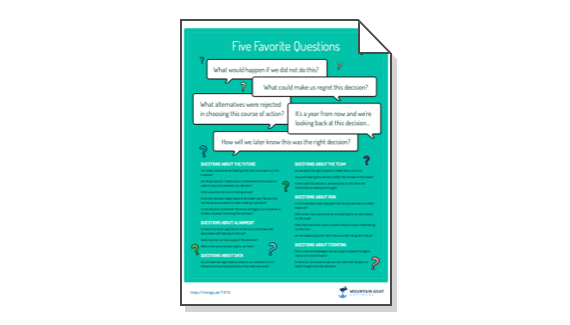A challenge for any leader is to resist the temptation to say, “Do this” or “Do it because I’m the boss.” Sure, there are situations where that can be appropriate. But the best leaders will rely more on influence than on direct authority.
One of my favorite ways of influencing is by asking questions. I do this frequently when working with a team that is trying to make a decision or that has just made a decision that they’re explaining to me.
I might ask, “What was the second-best option you considered?” I’ll then perhaps follow it up with, “Why did you prefer the option you chose?” These questions can help bring out any dissenting opinions that still exist on the team.
Questions such as these also force a team to explain the rationale for their decision. I’ve witnessed countless times when doing so forced team members to re-evaluate, and occasionally change, a decision.
When I ask hard questions of a team, I sometimes have an agenda—a decision I hope they’ll make. But most of the time, I don’t have a specific agenda: I’m just trying to make sure they are making what they’ll consider the right decision. Good questions help do that.
My Five Favorite Questions
I have more than twenty good questions I often use that I want to share. But let’s start with my favorite five, and the ones I use most often.
1. What Would Happen if We Did Not Do This?
A common trap is to think that a decision involves choosing which of two options to pursue. There is always a third option: doing nothing.
Doing may not be a good option. If you are paddling a canoe toward a rock, choosing to go left or right around the rock will be a wiser choice. But sometimes doing nothing can be wise, especially as it may give the team more time to become better informed and make a better decision later.
2. What Could Make Us Regret This Decision?
Asking a team what could make them regret a decision is a powerful way to identify potential problems or risks with the decisions. We can hope that most were discussed by team members during the decision-making process, but this offers a last chance to surface anything someone is worried about.
3. What Alternatives Were Rejected in Choosing This Course of Action?
Asking a team to list the alternatives that were considered allows anyone not fully aligned with the decision a chance to voice their opinions.
Many seemingly unanimous decisions are not fully supported by everyone. If some team members have previously relented and gone with the majority while not fully embracing the decision, this gives them a final opportunity to voice concerns.
4. It’s a Year from Now and We’re Looking Back at This Decision...
The full question I like to ask is: “It’s a year from now and we’re looking back at this decision. What’s happened that would make us regret the decision we’re about to make?”
Envisioning our future selves looking back on a decision is a good way to anticipate possible problems. Once they’re identified, team members can discuss whether the decision is still correct considering these potential problems.
5. How Will We Later Know This Was the Right Decision?
Asking how we’ll later know we made the right decision is great because it forces team members to be clear about their goals in choosing among alternatives.
Depending on the decision being made, a team may define success criteria such as:
- The technology scales to the level we need
- Daily Active Users (DAU) increase by 25%
- We never talk about this again
Doing this up front can help build agreement around the right decision.
Additional Questions
In addition to my favorite five questions above, I’ve compiled a list of additional questions. Below, they’re grouped into topics but the groupings are rough and most questions address more than one aspect of the decision being made.
Questions about the Future
- Are there choices we’re making here that could paint us into a corner?
- Are there specific milestones or deliverables that would be used to stop and reassess our decision?
- What would be the cost of being wrong?
- Does this decision really need to be made now? Would it be beneficial and possible to defer making a decision?
- Is this decision reversible? What would trigger us to reverse or at least consider reversing the decision?
Questions about the Team
- Do we have the right people to make this a success?
- How will making this decision affect the morale of the team?
- If we make this decision, will everyone on the team be committed to seeing it through?
Questions about Alignment
- Is there top-down alignment on the value and trade-offs associated with taking on this risk?
- Does anyone not fully support this decision?
- What is the second-best option we have?
Questions about Risk
- Is there another, less risky path that would represent a better trade-off?
- What other risks should we be considering (as an alternative to this one)?
- What data would be used to assess impact/value of delivering on this risk?
- Are we balancing short-term pressure with long-term value?
Questions about Iterating
- What tools and strategies can we apply to assess/mitigate risk as we move forward?
- Is there an incremental step we can take that will give us better insight into the decision?
Questions about Data
- Do we have the right data to validate our decision? If not, should we move forward without that data we need?
Last update: July 15th, 2024









